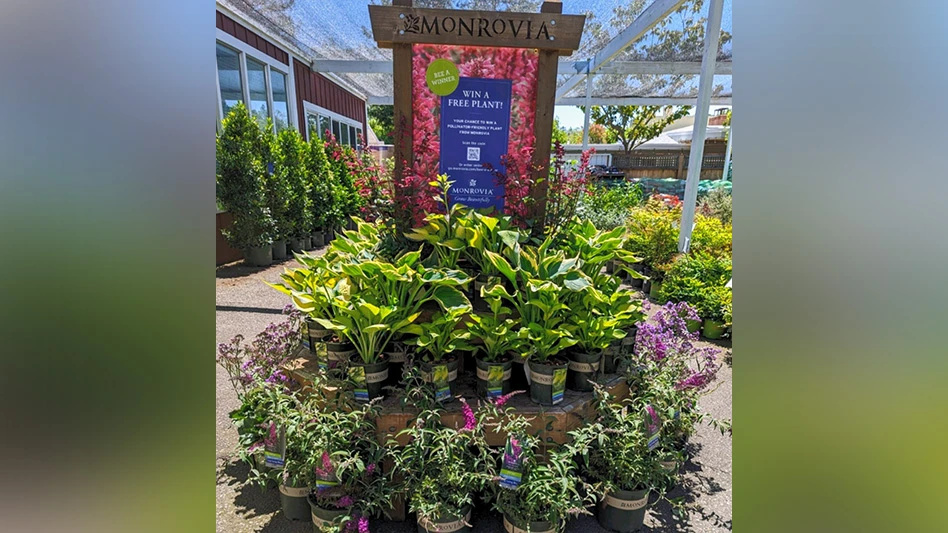
Rawpixel.com | Adobe Stock
 There I was, 800 miles away from my beloved garden center, surrounded by like-minded individuals all set out with a common goal — to improve their business. With my name tag proudly on display, I was ready to obtain the knowledge and information needed to make our store the best in the business.
There I was, 800 miles away from my beloved garden center, surrounded by like-minded individuals all set out with a common goal — to improve their business. With my name tag proudly on display, I was ready to obtain the knowledge and information needed to make our store the best in the business.
Of course, just like a proud mother rarely sees faults in her own child, I was certain that my garden center was superior already, up to every expectation imaginable. As I perused a few booths, a man came up to me and firmly grabbed my hand and gave it a solid shake, and then proceeded to tell me about how he was certain that he heard somewhere that my garden center had gone belly up a few months prior. Ouch. Not long after that I was confronted by yet another man, claiming to be from “right up the road” and how he didn’t know we existed. Ouch again.
Stand up and be seen
Nothing gives you the feeling of uselessness in the business world more than being invisible. It is very much a feeling like you would get as a small child singing in a Christmas pageant. You have talent (or so you think) and you have a song to sing to the world, but your luck has put you in the very back row and you’re short. No matter how great of a singer you are, you’re not going to be seen if you have a group of tall kids in front of you.
As a business owner or manager, you have to find a delicate balance between being front and center at all times and being less visible. Being able to put yourself in the spotlight when the time is appropriate and stay back in the shadows when it suits you isn’t always as easy as hiding behind the tall kids at the school pageant though. This business sense requires mastering the art of being adaptable and using your public relations pull at the right time and in the right way.
Free press isn’t always good press
Public relations can help you or hurt you, and the only way you can issue yourself a public relations insurance policy is to be aware of the fact that you and your business are in the spotlight at all times. The public’s view of your business is far deeper rooted than the billboards that you put up or the magnets you put on the sides of your company trucks. You have to think in a more micro-minded basis and take a few things into consideration before reacting, or not reacting for that matter, to an issue of public relations. This could be something as small as the “Killer bees, news at 11” report or a drought that has plagued your entire growing zone and put restrictions on how and if you can water.
It may not seem like the “killer bee” news story would damage your business, but it can. Our garden center was asked politely by the local news channel if it could come down and tape a segment for the evening news, and of course we agreed. The news crew came out and filmed our flowers, our lovely staff and the front of our building. All the while I was thinking it was great, free advertisement. Six o’clock rolled around, and to my dismay, the reporter explained how dangerous bees are and to stay away at all costs, with images of our garden center as the backdrop. At that moment, I wished there was a magical wand to make the garden center disappear from the story and get out of this negative spotlight.
Deactivate a ticking time bomb
After this bomb dropped, the timer was ticking on if and how we were going to respond to the negative news story. Timing in situations like this is critical; without acting when the wound is fresh, you risk the possibility of the incident being absorbed by the public and accepted as a cold hard fact.
Take the second example of an impending drought. When the news feeds first inform the public that a drought is imminent in your area and water restrictions will occur, be proactive.
Start your game plan immediately on how to develop a counterattack
Keep your information up to date and fresh, and always keep up with what the news is telling the public.
 Invest in a newspaper subscription and keep an eye on local Internet sites and social media. This will give you an excellent window into the world of the public and how to develop relations with them. Hit pieces always conjure up emotions in the public, and if you’re able to capitalize on this emotion you can turn those emotions into profits.
Invest in a newspaper subscription and keep an eye on local Internet sites and social media. This will give you an excellent window into the world of the public and how to develop relations with them. Hit pieces always conjure up emotions in the public, and if you’re able to capitalize on this emotion you can turn those emotions into profits.
When it came to the bee story, we combated the news piece with an Internet piece on the benefits of bees. It showed us in a concerned light, but at the same time, it showed that we cared about the Earth and aren’t interested as a business in killing off innocent bees just because the news claims they are bad. After the counterattack is made, don’t prolong the issue longer than necessary; say your piece and go about your normal business practice, but always keep an eye on the news. By losing your invisibility and standing front and center to defend your business, you show that you care, and the public appreciates businesses that care.
Don’t break the bank
Implementing some sort of public relations communication can be tricky, especially if you are on a limited budget or lack creativity or time. If the circumstances are drastic enough that you need to spend serious capital, take the time to analyze finances to figure out how you can fit public relations into your budget. Using the drought for an example again, show the public that you’re aware of the situation and you’d like to help. Offer free consultations on how to garden in dry conditions or host workshops teaching the public how to xeriscape.
By showing that you’re willing to set aside your time, money and expertise, the public will view you as a proactive establishment and in a positive light. Take genuine responsibility for the issue at hand, and don’t feign interest; participate with all your might.
Nurture your public relations and watch it grow
Plant yourself firmly in the ground, too, by placing little hints of your business around town. Start small, and keep it small. Little statements add up to one big impact after a while.
Check into the local outdoor scene, and find out if there are any parks or trails being reconstructed that you could help.
Participate in the building or maintenance of new playgrounds, which are great areas to reach younger target audiences.
Contribute a little something to a local park to help beautify something that might otherwise be ugly.
Beauty is popular with the public, and if your garden center name is attached to the statement, “That new park looks great because of insert your name and good public relations here,” you may be able to capture an audience that was otherwise unaware of your store. Find hot topics in your area and get your name associated with those activities — it will help fill your parking lot with new, happy customers. Members of the public want to spend money at shops that support the community. Look toward nonprofits that would be happy to get a donation wherever they can such as:
- little league teams
- community gardens
- garden clubs
- school projects
- Boy and Girl Scout troops
- retirement homes
- YMCA
Stand out from that back row and let your song be heard, and if it takes moving the tall kids from out in front of you, get busy! You deserve to be seen and heard.
Nikki Weed is a horticulturalist and professional adventurer who uses her experiences and knowledge to manage a successful garden center in Greenville, S.C. She can be reached at pepitaweed@gmail.com.

Explore the January 2013 Issue
Check out more from this issue and find your next story to read.
Latest from Garden Center
- This Florida garden center's busiest days are in the fall, not spring. Find out how they do it
- Terra Nova Nurseries releases new agastache variety, 'Peach Pearl'
- The Certified Shopify Online Garden Center provides local retailers with ecommerce tool
- Meet the All-America Selections AAS winners for 2025
- Endless Summer hydrangeas and Suntory Senetti glam up Grammys red carpet
- Ball Seed releases 2025 edition of 'Thrive and Flourish' for landscape and garden retail
- American Floral Endowment's Fred C. Gloeckner Foundation Research Fund accepting grant proposals
- Floral Marketing Fund and CalFlowers partner to advance floral industry





